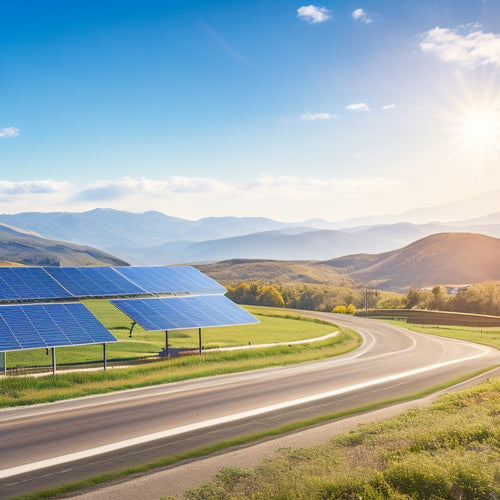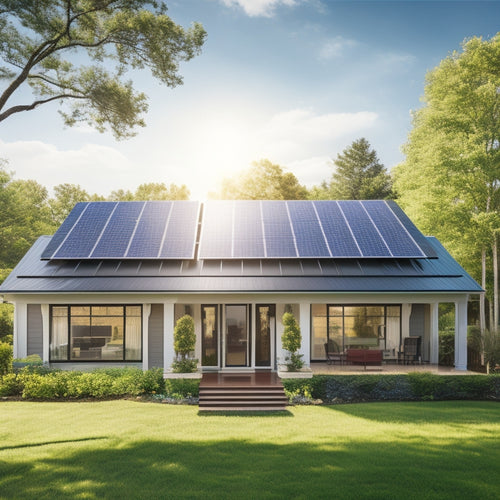
Purpose of Solar Inverter Systems in Renewable Energy
Share
Solar inverter systems are essential in renewable energy as they convert direct current (DC) generated by solar panels into alternating current (AC), which is usable for homes and the grid. They enhance energy production through technologies like Maximum Power Point Tracking (MPPT) and improve overall system efficiency. By optimizing energy flow, inverters reduce electricity bills and increase energy independence. Furthermore, their reliability guarantees steady power generation, minimizing maintenance needs. When you understand the different types and features of solar inverters, you'll make informed decisions that can maximize your solar energy benefits.
At a Glance
- Solar inverters convert DC power generated by solar panels into AC power for home use or grid integration.
- High-quality inverters with MPPT technology optimize energy production by adjusting to varying sunlight conditions.
- Various inverter types, including string, microinverters, and hybrid inverters, cater to different installation needs and enhance overall efficiency.
- Solar inverter systems significantly reduce electricity bills and support energy independence while offering a return on investment through financial incentives.
- Advanced performance monitoring ensures consistent energy output and reliability, adapting to environmental changes for maximum efficiency.
Efficiency in Energy Conversion
In the energy conversion process, understanding how solar inverters change DC to AC power is essential for maximizing efficiency.
High-quality inverters that employ MPPT technology can greatly enhance energy production by continuously adjusting to the ideal power point of the solar panels.
You'll want to pay attention to inverter efficiency ratings, as they directly impact your system's overall performance.
Energy Conversion Process
The efficiency of the energy conversion process in solar inverter systems directly impacts the overall performance of renewable energy installations. When you utilize solar energy, inverter technology plays a vital role in converting direct current (DC) into alternating current (AC), making it usable for your home or grid integration. High-efficiency inverters guarantee peak power management, reducing losses during conversion and enhancing energy storage capabilities.
Here's a quick overview of key factors affecting energy conversion efficiency:
| Factor | Description |
|---|---|
| Voltage Regulation | Guarantees stable output for appliances |
| System Monitoring | Tracks performance and detects issues |
| Environmental Impact | Lower losses result in less waste heat |
| Technological Advancements | Innovations improve conversion rates |
With advancements in inverter technology, you can expect better voltage regulation and improved energy storage solutions. This not only enhances the efficiency of solar installations but also minimizes environmental impact. By understanding these elements, you equip yourself to make informed decisions about renewable resources, guaranteeing your energy systems operate at peak performance.
Inverter Efficiency Ratings
When evaluating solar inverter systems, understanding inverter efficiency ratings is essential for optimizing energy conversion. These ratings indicate how effectively an inverter converts direct current (DC) from solar panels into alternating current (AC) for household use. A higher efficiency rating means less energy loss during conversion, maximizing your renewable energy potential.
Inverter design plays a critical role in achieving these efficiency ratings. Modern inverter technologies, such as string inverters and microinverters, offer various benefits customized to different setups. String inverters are often more cost-effective for larger installations, while microinverters provide higher efficiency for smaller systems, especially in shaded conditions.
You should also consider the peak efficiency and the European Efficiency (EU) rating, which offers a more realistic view of performance under standard conditions. Tracking these metrics allows you to gauge how well an inverter meets your energy needs over time.
Ultimately, by prioritizing high-efficiency inverters, you're not just investing in technology; you're embracing a sustainable lifestyle that maximizes your energy independence. Choosing the right inverter can greatly impact your system's overall performance and longevity, allowing you to utilize the full power of solar energy.
Cost Savings Over Time
As you implement solar inverter systems, you'll notice a significant reduction in your electricity bills, translating to immediate financial relief.
These systems support energy independence and contribute to clean energy production, which enhances your overall savings.
Over time, this technology not only pays for itself but also starts generating substantial returns on your initial investment.
Understanding these cost savings is essential for maximizing the long-term benefits of your renewable energy strategy.
Reduced Electricity Bills
Implementing solar inverter systems can lead to substantial reductions in your electricity bills over time. By converting the direct current generated by solar panels into usable alternating current, these systems optimize energy usage, maximizing your solar savings. As you utilize more of the sun's energy, you'll notice a significant bill reduction, altering how you perceive your energy costs.
The technology behind solar inverters allows for real-time monitoring and adjustments, ensuring your system operates at peak efficiency. By utilizing advanced algorithms, inverters can intelligently manage energy flow, reducing reliance on grid power. This not only cuts down your monthly expenses but also provides you with a sense of freedom from fluctuating utility rates.
Moreover, as electricity prices continue to rise, your investment in solar inverter systems offers a hedge against these inevitable increases. The more energy you produce and consume on-site, the less you rely on external sources.
Embracing solar energy not only enables you economically but also aligns with a sustainable lifestyle. In the long run, these systems deliver substantial financial benefits, contributing to a more independent and environmentally conscious way of living.
Long-Term Investment Returns
Investing in solar inverter systems not only leads to immediate savings on electricity bills but also offers significant long-term financial returns. By implementing effective investment strategies, you can maximize your return over the lifespan of your solar energy system. These systems typically have warranties of 10 to 25 years, ensuring that your initial investment continues to pay dividends long after the installation.
Financial incentives, such as tax credits and rebates, can further enhance your investment's profitability. Many governments provide substantial incentives for renewable energy adoption, reducing the upfront costs and accelerating your return on investment.
As energy prices continue to rise, the savings you accrue over time become even more pronounced, contributing to a more self-sufficient lifestyle.
Moreover, as technology evolves, you may find opportunities to upgrade or expand your solar inverter system, ensuring that your energy independence grows alongside advancements in efficiency. This adaptability reinforces the long-term viability of your investment.
Ultimately, embracing solar inverter systems isn't just an eco-friendly choice; it's a strategic financial decision that enables you to take control of your energy future while enjoying substantial savings.
Key Characteristics of Inverters
When evaluating solar inverters, you'll want to focus on their efficiency and performance as key indicators of their effectiveness in energy conversion.
With various types of inverters available, including market trends that favor more efficient solutions, each is designed to meet specific needs and applications.
Understanding these characteristics is essential for optimizing your renewable energy system.
Efficiency and Performance
Maximizing efficiency and performance in solar inverter systems is vital for optimizing renewable energy output. You'll find that inverter innovations play a key part in enhancing solar technology, guaranteeing that energy conversion from solar panels is as effective as possible.
By focusing on grid integration, these systems can harmoniously connect with existing power networks, thereby reducing environmental impact.
Technological advancements in inverter design, such as improved energy storage solutions, allow for better management of power distribution and consumption. You need to take into account system compatibility when selecting inverters, as this can directly affect overall performance.
Staying abreast of market trends helps you identify the most efficient products available, while understanding policy implications can guide your choices towards more sustainable practices.
Installation practices are equally important; proper setup guarantees that inverters operate at peak performance.
By prioritizing these factors, you can greatly enhance the efficiency of your solar inverter systems. In doing so, you not only maximize your energy output but also contribute to a cleaner, greener future.
Adopt these innovations and let them drive your commitment to renewable energy liberation.
Types of Inverters
Understanding the types of inverters is vital for optimizing your solar energy system, as each inverter type offers distinct characteristics that can greatly influence performance and efficiency.
Grid tied inverters are popular for their ability to connect directly to the utility grid, allowing you to sell back excess energy. If you're looking for more granular control, microinverter technology might be appealing; these devices are installed on each panel, maximizing output and minimizing shading issues.
Hybrid inverters combine grid-tied functionality with battery storage, providing flexibility during outages. String inverters, while cost-effective, require careful installation considerations since all panels operate at the same voltage. To enhance performance, power optimizers can be paired with string inverters, enhancing the output of each panel individually.
When selecting inverter brands, evaluate their advanced features, warranties, and maintenance practices. Some brands offer longer inverter warranties, which can be essential for long-term reliability.
Your choice of inverter can considerably affect your system's return on investment, so assessing these factors thoughtfully will help you achieve the freedom to utilize solar energy efficiently.
Selecting Based on System Size
When selecting a solar inverter, you need to evaluate both the system capacity and your energy demand.
Accurately gauging your energy needs guarantees that the inverter can handle the maximum load while optimizing efficiency.
High-efficiency inverters enhance energy harvesting and reduce energy losses, making them an essential choice for any renewable energy system.
System Capacity Considerations
Selecting the appropriate system capacity for solar inverter systems requires careful consideration of both the available solar resource and the specific energy demands of your application. Effective system sizing is essential in ensuring that your solar inverter can handle the load without compromising efficiency.
You'll want to analyze your energy consumption patterns and peak load requirements to determine the ideal inverter capacity. Load management plays a significant role in this process. By understanding your daily energy usage, you can avoid overloading the inverter, which could lead to inefficiencies or even system failure.
It's important to factor in potential future increases in energy demand, as well. By anticipating changes in your energy consumption, you can select a system that adjusts to your changing needs, ensuring your energy independence.
Moreover, consider the solar resource available at your location. Different regions receive varying amounts of sunlight, impacting the energy your system can produce. Balancing these elements will enable you to choose an inverter that not only meets your current needs but also supports your long-term goals for renewable energy.
Seize this opportunity to enhance your system capacity and enjoy the freedom that comes with efficient energy management.
Energy Demand Assessment
To accurately evaluate energy demand for solar inverter systems, you must analyze both your current consumption patterns and anticipated future needs.
Begin by examining your usage data to identify peak consumption times and the solar resource available in your area. Consider future trends in energy consumption that may arise from lifestyle changes or increased reliance on electrical devices.
Next, factor in technology advancements that enhance grid integration and energy storage capabilities. These innovations can greatly affect how you assess your energy needs. For instance, the growing availability of energy storage systems allows you to optimize self-consumption during off-peak hours, maximizing your environmental benefits.
Policy impacts and market shifts also play an essential role in shaping your energy environment. Understanding local regulations and incentives can help you make informed decisions about system size and expected returns.
Lastly, prioritize user experience and system maintenance while selecting your solar inverter. A well-sized system guarantees efficiency and longevity, enabling you to utilize the full potential of renewable energy.
Higher Reliability in Performance
When evaluating solar inverter systems, you'll notice that consistent energy output is essential for maximizing efficiency.
By focusing on higher reliability in performance, you can guarantee that your system generates power steadily, even under varying conditions.
This reliability not only enhances energy production but also reduces the risk of system failures and maintenance costs.
Consistent Energy Output
The reliability of solar inverter systems plays an essential role in achieving consistent energy output, ensuring that you get the most from your renewable energy investment. By effectively managing energy storage and grid integration, these systems enhance output stability, allowing you to utilize solar technology's full potential.
With advanced performance monitoring, you can track your system's efficiency in real-time, enabling proactive adjustments that optimize performance. This level of oversight also supports renewable integration, ensuring that your energy feed aligns with grid requirements and fluctuating demands.
Load balancing is another critical aspect; by distributing energy evenly across your system, you minimize the risk of overloads or dips in output.
System optimization techniques further enhance your solar inverter's ability to maintain consistent energy flow, adapting to changing environmental conditions without compromising productivity.
Ultimately, investing in a reliable solar inverter system means you're not just embracing renewable energy; you're seizing the freedom and security of consistent power generation.
Frequently Asked Questions
How Do Solar Inverters Impact Environmental Sustainability?
Solar inverters greatly enhance solar efficiency by converting DC to AC power, reducing energy loss. By maximizing output, they lower your carbon footprint, contributing to a more sustainable environment and supporting your quest for energy independence.
Can Inverters Work During Power Outages?
Yes, inverters can work during power outages if you have a battery storage system. This setup grants you grid independence, ensuring energy efficiency by utilizing stored solar energy, keeping your home powered even when the grid fails.
What Is the Lifespan of a Solar Inverter?
Ever wondered how long your solar inverter lasts? Typically, it's around 5 to 15 years. Regular inverter maintenance and efficiency optimization can greatly extend that lifespan, ensuring you enjoy sustainable energy freedom for longer.
Are There Different Types of Solar Inverters?
Yes, you'll find different types of solar inverters, including string inverters, which offer advantages like cost-effectiveness, and micro inverters, known for their efficiency. Each type suits various applications and energy needs, enhancing your solar experience.
How Do Inverters Integrate With Energy Storage Systems?
Imagine a tableau where inverters dance with energy storage systems, orchestrating inverter efficiency and energy management. They harmonize energy flow, ensuring you utilize every sunbeam, granting you the freedom to power your world sustainably and efficiently.
Explore More
In summary, solar inverter systems play an essential role in optimizing renewable energy usage, ensuring efficient energy conversion and long-term cost savings. By understanding their key characteristics and selecting the right inverter based on your system size, you can greatly enhance reliability and performance. Just like the advent of smartphones changed communication, adopting these advanced inverters can innovate your energy management. Accept this innovation, and you'll utilize the true potential of solar energy for a sustainable future.
Related Posts
-

Is This the Future of Alternative Energy Systems
Yes, alternative energy systems are shaping the future of energy. Innovations in solar and wind technologies are driv...
-

Is Switching to Green Energy Solutions Easy
Switching to green energy solutions isn't just easy; it's also beneficial. You can greatly cut utility costs and enjo...
-

Home Solar Installation Cost
You're considering installing solar panels on your home, and the upfront cost is likely the biggest hurdle standing i...


